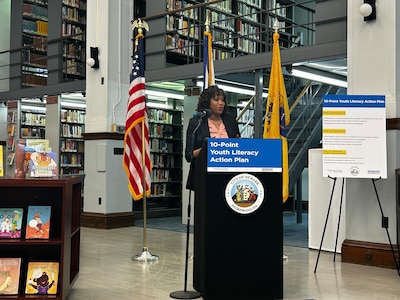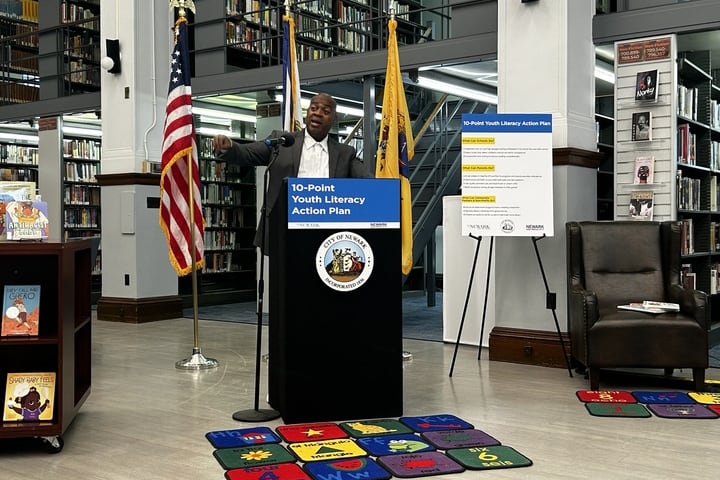Surrounded by books at the Newark Public Library on Tuesday, Newark Mayor Ras Baraka announced a 10-point Youth Literacy Action Plan that calls on the city’s schools, parents, community partners, and programs to get young children reading and writing amid low state test scores.
The plan focuses on developing literacy opportunities in all city programs, improving access to books that reflect cultural and ethnic backgrounds, encouraging expectant parents to read to their unborn children, and providing tutoring for students during the school day, among other points.
City, community, and local partners will work to pool their resources to promote the plan, host events and giveaways, and teach parents how to create reading opportunities for their children, city leaders said during a press conference on Tuesday.
“It is all our responsibility to make sure that our kids are reading on grade level,” Baraka said on Tuesday. “I want everybody to feel the same heaviness and weight that I feel. We believe that this is urgent for all of us to be engaged in immediately.”
Last spring, only 49% of New Jersey students passed the state’s English language arts test and only 27% of Newark public school students reached proficiency levels. Among Newark’s third graders, only 19% passed the state’s test, the lowest of any grade in the city.
Experts say being able to read fluently impacts a child’s likelihood to graduate high school, pursue college, and ultimately a career. From kindergarten to third grade students are learning to read and by fourth grade, students are using reading skills to learn, said Newark’s Chief Education Officer Sharnee Brown during Tuesday’s press conference.
Baraka’s plan “emphasizes prenatal to third grade” children to ensure the literacy work begins early and sets students up for long-term success, Brown added. The plan also encourages expectant mothers to seek prenatal care in clinics throughout the city to build healthy brain development and recommends that parents read to their unborn children.
The city’s action plan also calls on parents to enroll young children in free pre-K3 and pre-K4 programs in district or charter schools or programs led by community-based providers. The goal is to motivate families to incorporate reading activities for their children at an early age and continue them outside of the school day by reading to them and helping build their vocabulary.
“I look at literacy as building a house and ensuring a good, solid foundation,” Brown added. “When we teach young people how to read well, we’re really teaching them how to excel.”
The action plan encourages Newark parents to develop a home library and provide children with access to books. Research shows that children growing up in a home with a 500-book library helps them stay in school for 3.2 years longer compared to homes that have little to no books.
Brown said the city and local community partners are working together to host book giveaways and reading events throughout Newark this summer. In August, the city will host its annual “Reading Under the Stars” event to teach families how to read together. The plan is to “incentivize and celebrate reading” and “make it a Newark culture” to read, Brown added.

“We’re creating these literacy events where parents come and get free books but we’re also teaching parents how to do some of this work,” Brown said.
The Newark Public Library also offers programming for children year-round including reading activities, and reading challenges for kindergartners, elementary, middle, and high school students.
“You really want to incorporate literacy and reading into everything,” said Asha Mobiley, youth services supervisor at the Newark Public Library. “We really want to meet our young readers where they are so that we can help them get to where we want them to be.”
Baraka is also calling on city schools to implement one-on-one high-dosage tutoring during, before, and after the school day to help grow in reading and writing skills.
Research shows that high-dosage tutoring, or 30-minute tutoring for two to three days a week, provides the most impactful results. Newark Public Schools will continue to host its after-school Excel program this coming school year to provide tutoring, but will create more tutoring opportunities while students are in school, Superintendent Roger León said during a June press conference.
Currently, the district utilizes skills from an evidence-based reading approach known as the science of reading to teach students how to read, said León in June. This coming school year, the district will be using the “Fundations” program to help students learn the foundational skills of reading such as phonics, spelling, and writing, Mary Ann Reilly, Newark Public Schools assistant superintendent and director of the Office of Teaching and Learning, said on Tuesday.
“We also want to make sure that children are building important knowledge and they’re using reading in order to do that,” Reilly added.
Additionally, Newark’s plan calls on community-based and after-school programs to incorporate a literacy component into their programming and mandate funding to programs and sports that incorporate some level of reading and literacy. All city programs must provide a literacy program and if they don’t, Baraka wants parents to hold those programs accountable.
The 10-point plan was developed through research-informed data on literacy and in collaboration with Baraka’s Brain Trust, a group of community organizations focused on improving reading levels in Newark.
Jessie Gómez is a reporter for Chalkbeat Newark, covering public education in the city. Contact Jessie at jgomez@chalkbeat.org.






